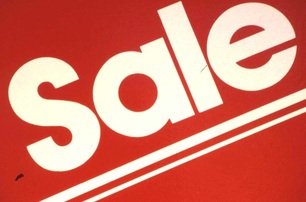
I maintain that selling on price is lazy in most any business at most any time. There are exceptions, of course:
· true commodities, where market forces drive the price (like fuel oil, aluminum or corn)
· marketers trying to make share inroads against entrenched category leaders
· stores located in off-price malls (although their prices are not always discounted)
· and products that nobody has bothered to differentiate.
Counter-intuitively, all too many retail businesses choose to sell at a discount when demand is high. Some discount all the time (vs. virtually none of the time for your local Apple retail store). These lazy retailers seem driven by no other reason than (a) “It’s always been done this way,” or (b) fear -- that unless they discount their goods their customers will go away, snapped up by the guy down the street with an even lower price. It’s interesting to note that buyers often rate price toward the bottom in consumer surveys, citing the greater importance of salesperson knowledge, product quality, good selection, solid tech support, etc. But once you’ve educated customers to expect that discount, you’ve got yourself stuck in a swamp – one that’s extraordinarily difficult to slog your way out of. Just ask J. C. Penney (see what they have wrought for themselves here by deviating too quickly from their long-term "sale" formula: http://www.hfnmag.com/retail/j-c-penney-to-close-stores-lay-off-2000/ ).
Many auto dealers provide a “price-first” case in point, where discounting is a baseline strategy -- if there’s not a sale happening now, wait ‘til next week! Of course, new car retailers also have become victims of the Internet, where the “dealer cost” of their products is widely available, and that magnifies (but does not excuse) the problem.
These days, the buying public has come to expect that what little profit there is left in news cars (especially the domestics) should be given to them – along with free car washes, oil changes, etc. Of course, car dealers largely have conditioned their customers to think this way by creating an adversarial relationship over a long period of time, so that most folks would rather have a tooth pulled than shop for a new car. Plus, it’s so much easier to sell on price than to sell dealership advantages – the qualities that set that store apart from every other dealer and compel people to want to do business with them almost regardless of what kind of car they sell.
Some piano stores also subscribe to this every-day-is-a-sale-day mentality. However, one dealer with whom I am acquainted has only one sale a year. It’s a real sale, not a bogus sale, and it works! His customers are happy, he is happy and the store’s bottom line is happy. This dealer sells mainly high-end European pianos at market value (varies with foreign exchange rates but essentially is set by the public and publicly available information), and although he does not represent industry leader Steinway & Sons, has taken a leaf from Steinway’s book: sell bedrock quality and service all the time and never stop selling bedrock quality and service. Sell on price ONLY when there is a clear and credible reason to do so within the context of an overwhelmingly positive customer experience that enhances rather than detracts from the brand, as habitual discounting invariably does. It’s a strategy that works for my dealer friend and for Steinway, and both get the margins they want -- and need -- to thrive in a relatively low volume business.
Takeaway: Don’t be a price lemming. Price according to the unique combination of competitive advantages you present to your customers.

 RSS Feed
RSS Feed